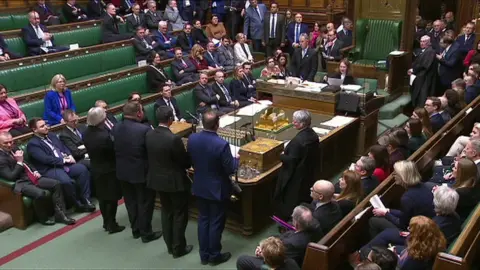By Kate WhannelPolitical reporter, BBC News
Rishi Sunak has succeeded in getting his key Rwanda bill through the House of Commons after a Tory rebellion failed to materialise.
The bill, which aims to stop legal challenges against ministers’ plans to send asylum seekers to Rwanda, was approved by 320 votes to 276 votes.
Dozens of Tories thought the bill was flawed and had threatened to rebel but in the end, only 11 voted against it.
The bill now goes to the House of Lords where it will face stiff opposition.
Mr Sunak argues that deporting some asylum seekers to Rwanda will be a deterrent to migrants seeking to get to the UK by crossing the Channel in small boats, but Labour has labelled the plan an expensive “gimmick”.
The government is hoping to get the flights to Rwanda running by the spring.
The prime minister is due to hold a Downing Street press conference on the policy at 10:15 GMT.
Over the past two days MPs on the right of the Conservative Party have tried to change the bill, arguing that, without amendments, the government’s Rwanda plan could be blocked by the courts.
On Wednesday, former immigration minister Robert Jenrick tabled an amendment which would permit the UK government to ignore parts of human rights law in relation to sending people to Rwanda.
Mr Jenrick also proposed an amendment which would ensure ministers automatically reject last-minute interim orders from the European Court of Human Rights.
Such an order was responsible for blocking a flight to Rwanda back in June 2022.
The amendment was not approved by MPs but received the backing of 61 Conservatives – the biggest rebellion of Mr Sunak’s premiership.
Some MPs had suggested they would be willing to abstain or even vote against the entire bill if it remained unchanged.
The bill could have fallen if about 30 Conservatives had voted against it – an outcome that would have severely damaged the prime minister’s authority, potentially fatally.
However, in the event, just 11 MPs – including Mr Jenrick and former Home Secretary Suella Braverman – voted against it.
Other Tory MPs on the list include Miriam Cates, Sir Simon Clarke, Mark Francois and Danny Kruger.
Eighteen Conservative MPs did not record a vote, however some of those may have simply been unable to attend the vote rather than deliberately abstaining.




Two things matter at Westminster – noise and numbers. We have had bucketloads of both these last few days.
But numbers, in the short term at least, always matter more – and the government had them, the rebels did not.
The story of this week here is this: around 60 Conservative MPs have major reservations with the government’s Rwanda plan, which boil down to a central concern – they fear it probably won’t work.
But the vast majority of those 60, in the end, thought sticking with a plan that might work was better than junking it – and, in their view, guaranteeing it won’t.
Among the 11 rebels who did vote to junk it – and said they had their own plan that would work – three recent former cabinet ministers: Suella Braverman, Robert Jenrick and Sir Simon Clarke.
Suella Braverman’s verdict was blunt. “I could not vote for yet another law destined to fail. The British people deserve honesty and so I voted against,” she said.
The Rwanda plan lives on – and that is good news for Rishi Sunak. But the real prize for him is demonstrably proving the policy is delivering. And we are some distance from that.


Conservative Danny Kruger, who voted against the bill, said some of his colleagues had opted to support the legislation despite their concerns in order to avoid “political disruption”.
Sir Simon Clarke, who also opposed the bill said: “All Conservatives want the Rwanda policy to succeed… the profound misgivings some of us hold about the bill are on record, but history will now relate who was right.”
Labour opposed the bill, with shadow home secretary Yvette Cooper labelling the policy a “costly con” that had so far failed to send any asylum seekers to Rwanda, and shadow immigration minister Stephen Kinnock branding it “unaffordable, unworkable, [and] unlawful”.
Home Secretary James Cleverly defended the plan arguing that it sent “an unambiguously clear message that if you enter the United Kingdom illegally you cannot stay”.
“This bill has been meticulously drafted to end the merry-go-round of legal challenges,” he added.
The debate over the legislation has exposed on-going divisions among Conservatives – on Tuesday evening two deputy chairmen, Lee Anderson and Brendan Clarke-Smith, quit their roles in order to vote for the rebel amendments.
Despite his concerns, Mr Clarke-Smith back the bill at the final stage, while Mr Anderson did not register a vote.
One rebel source told the BBC: “It is not the case that tonight’s vote is the end of matters. If the House of Lords chooses – as I suspect they will – to send back amendments that weaken the bill, the response of those [right-wing Conservative MPs] will be to table amendments in lieu that toughen the bill.”
“The prime minister is by no means out of the woods.”

 HoC
HoC
Following its approval in the Commons, the bill will now move to the House of Lords where it is expected to face serious opposition.
Home Office minister Chris Philp told BBC Breakfast on Thursday: “The bill has obviously got to go through the House of Lords now. I hope that will happen pretty quickly.
“We want these flights to take off as soon as possible and the aim is to do that this spring.”
But pressed on former minister Jacob Rees-Mogg’s comments on BBC Newsnight that it would be “unlikely” Rwanda flights would take off before the next election, Mr Philp said he did not share his “pessimism”.
He also played down divisions in the party and the suggestion Tory rebels voted for the legislation to avoid a look of disunity ahead of the election.
“I don’t accept that … overall there was near unanimity on the Conservative side that this bill as a whole made sense and represents a very significant step forward,” he said.
On Wednesday Rwanda’s President Paul Kagame said he would return money to the UK if no asylum seekers were sent to his country.
The UK has so far paid £240m to the east African nation and is expected to pay a further £50m.
A Rwandan government spokeswoman later said the country had “no obligation” to return the money but would consider a request for a refund from the UK.
In Westminster, a Downing Street spokesman was forced to deny it was trying to change the Civil Service code to include a presumption that emergency injunctions from the European Court of Human Rights should be ignored.
At the start of the day Home Office Minister Michael Tomlinson had said the government was “looking at that”, but hours later No 10 said it was not seeking to rewrite the code.
The Cabinet Office later issued guidance stating that it was the “responsibility” of civil servants to “implement” a minister’s decision to ignore rulings from the court.


